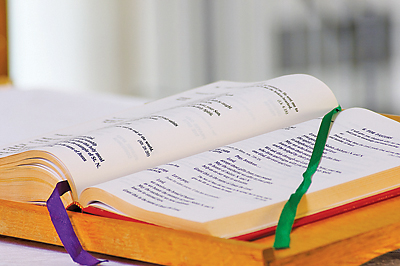
 RCIA. The four letters stand for the Rite of Christian Initiation of Adults, and most cradle Catholics are familiar with them from listings in weekly bulletins.
RCIA. The four letters stand for the Rite of Christian Initiation of Adults, and most cradle Catholics are familiar with them from listings in weekly bulletins.
RCIA, however, is one of the most important elements in Catholic evangelization.
It is the formal way in which people interested in becoming Catholic inquire about the faith, learn about church teachings, Mass and the sacraments, and then become members of the church.
The challenge for RCIA coordinators and catechists in an increasingly secular, busy and technology-obsessed world is how to attract the attention of people who may be searching for what Catholicism has to offer.
“Invitation to Conversation: Building up the RCIA” was the focus of a special Internet class and discussion offered June 15 by the Paulist National Catholic Evangelization Association. The hour-long session was followed by more than 250 people from around the country.
Paulist Father Frank DeSiano led the conversation and took suggestions about ways to help more people learn about RCIA classes, promote what parishes have to offer, and recognize a seeker.
“We all need to think of creative ways to increase the number of people who can discover Jesus Christ through the RCIA,” Father DeSiano said. “By and large the Catholic Church in the United States has not begun to figure out how to project itself beyond its own reality.”
The priest and several catechists stressed the importance of making parishes open and receptive communities for newcomers. He also suggested creative ways to publicize classes and activities, and highlighted the role of the Internet to spread information.
Directors of religious education and catechists from the Diocese of Charleston agreed the key to attracting people to RCIA is providing a non-intimidating atmosphere. They also said it is important for the entire parish to be involved.
Many parishes hold RCIA inquiry sessions that begin in the fall and continue until spring, when catechumens and candidates join the church at Easter.
Glynnis Doolittle, director of religious education at Our Lady of Peace Church in North Augusta, said the process at her parish is ongoing. The year-round approach works because it makes RCIA available whenever seekers are ready, she said.
In addition to flyers and bulletin announcements, Doolittle sends personal letters of invitation to the non-Catholic spouses of new parishioners.
Perennial inquiry is also the norm at Our Lady Star of the Sea Church in North Myrtle Beach, said Deacon Peter M. Casamento, pastoral associate and coordinator of the RCIA program. He has used a billboard and the Internet to publicize it.
“For a parish RCIA program to be successful, you need the involvement of the parish community itself, and you need to have a sense of welcoming,” he said. “If people are welcomed when they come into the church, if they feel that sort of environment and mentality in the church, then they may say there’s something here, and I want to be part of it.”
Deacon Casamento said it is important to view the rite as a process of inquiry and faith sharing rather than a religious education class with prescribed questions and answers.
“My approach is to first make sure they have a solid relationship with Jesus Christ…” he said. “Jesus Christ comes first, and then all the other teachings, the doctrine, just fall into place.”
Community involvement is a big part of RCIA at St. Paul the Apostle Church in Spartanburg, said Norma Stokes, director of religious education.
“The important thing for me was to make sure we got people from the parish involved in RCIA so it wasn’t just the priest and the deacon and me doing the program,” Stokes said. “We wanted to make it a parish effort, and invited everybody to participate in the welcoming part of RCIA, to offer to be sponsors, provide hospitality and be part of discussions.”
Stokes said many people who have entered the program in recent years have been friends or coworkers of parishioners.
“I think a big part of the credit is the people at St. Paul’s evangelizing by their example,” she said. “People look at them and say ‘you really look like you have something good going on in your life.’”
Our Lady of Mercy Sister Donna Lareau said parishioners are actively encouraged to play a part in RCIA at Christ Our King Church in Mount Pleasant, where she serves as director of religious education.
Sister Donna said bulletin announcements and listings in area newspapers can be important ways to publicize classes, but it’s individual believers who bring people to the program.
“RCIA starts with the parishioner in the pew,” she said. “If they are encouraged to be open about their faith, then when a coworker or an in-law or relative asks them about their church, they feel free to start the conversation, and from that conversation can come an invitation to learn more.”
